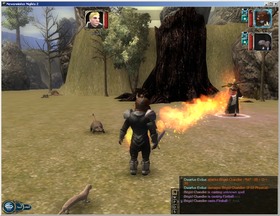Rightly or wrongly a great deal of attention has been focussed on the role of computer games in the rising obesity problems in the West. While much of this attention has been negative, many researchers have been looking at the benefits of digital games designed to promote healthy behaviours. My program in this area grows out of the ubiquitous or mixed reality games, which implicitly have a health component, to encompass a broad range of digital health interventions, particularly focussed on school-aged populations. Distinct from the measuring human behaviour stream, which seeks to use sensors, computer science and social science theories to explain why people do what they do, this research attempts to use those same tools to change what people do.

Example Projects
Gemini: In Gemini we use real world activities to alter the state of a persistent game world. Taking the example of a fantasy MMO, levelling up of the character happens through real world activity rather than traditional game mechanics, theoretically incentivizing behaviour change.
School Interventions: Sedentary activity in children can cause health issues irrespective of their activity level. Because this requires moving at regular intervals, antisendentary measures require periodic activities integrated into the school curriculum. We have designed and evaluated a number of gamified interventions for middle-school children.
Exergame Papers
- Mandryk, R. L., Gerling, K. M., & Stanley, K. G. (2014). Designing games to discourage sedentary behaviour. In Playful User Interfaces (pp. 253-274). Springer Singapore.
- Watson, D., Mandryk, R., Stanley, K., The Design and Evaluation of a Classroom Exergame, (2013), Gamification '13, 34-41.
- Stanley, K. G., Livingston, I. J., Bandurka, A., Hashemian, M., & Mandryk, R. L. (2011). Gemini: a pervasive accumulated context exergame. In Entertainment Computing–ICEC 2011 (pp. 65-76). Springer Berlin Heidelberg.
- Stanley, K. G., Livingston, I., Bandurka, A., Kapiszka, R., & Mandryk, R. L. (2010, May). PiNiZoRo: a GPS-based exercise game for families. In Proceedings of the International Academic Conference on the Future of Game Design and Technology (pp. 243-246). ACM.
- Stanley, K. G., Pinelle, D., Bandurka, A., McDine, D., & Mandryk, R. L. (2008, November). Integrating cumulative context into computer games. In Proceedings of the 2008 conference on future play: Research, play, share (pp. 248-251). ACM.
- Mandryk, R. L., & Stanley, K. G. (2004, September). Gemini: Accumulating context for play applications. In Proceedings of the Ubicomp 2004 Workshop on Playing With Sensors.